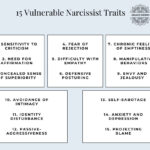Behavioral Cycle of a Narcissist
What does communicating with a narcissistic person look like?
Arguing with a narcissist is not the same as having an argument with an emotionally intelligent person. The discussion can never get anywhere, and you will never win an argument as they always have to be right. If you always get blamed by your partner for everything that goes wrong, you might be dating a narcissistic person.
When you are dating a narcissist, you feel like you’re walking on eggshells. You’re always trying to avoid saying or doing the wrong things to make sure that you don’t anger the narcissist. The thing is that no matter how hard you try, you cannot get anywhere as there’s always something that seems to trigger him off.
Narcissists aren’t emotionally stable, their ego is too fragile and they act like kids when they don’t get what they want. They have a great sense of entitlement and they expect to receive special treatment from everyone around them. Even though they might seem super confident, that’s actually a mask to cover their low self-esteem. That’s why they are so sensitive to criticism.
A relationship with a narcissist can start off feeling like a fairytale. Until the first time the narcissists’ ego feels threatened. I want to walk you through the pattern that a narcissist follows in a relationship. Once you become aware of this pattern, and you recognize it in your own relationship, it will become clearer to you why you have been feeling so chaotic.
Educating yourself about this mental health issue will help you heal from the narcissistic abuse as you finally start getting recognition for your reality.
If you would like to educate yourself about narcissistic personality disorder, heal your trauma, and find purpose, joy, and meaning in life, I invite you to join my Narcissistic Abuse Recovery Program. You’ll be provided with tools and techniques that guide you toward freedom, healing, and empowerment. (If you prefer one-to-one sessions, I offer Narcissistic Abuse Counseling personalized sessions according to your needs and specific situation).
What is the behavioral cycle of a narcissist?
The behavioral cycle of a narcissist is a predictable, yet distressing loop that encompasses phases of ego threat, abusive behavior, playing the victim, and empowerment.
When their fragile ego is threatened, a narcissist reacts defensively, resorting to various forms of abuse to regain control.
As tensions escalate, they deftly play the victim, twisting facts and evoking sympathy. This power play manipulates the victim into accepting blame, bolstering the narcissist’s perceived superiority.
Ultimately, feeling vindicated and empowered, they thrive on this cycle, repeating it whenever their dominance is at stake.
This cycle perpetuates the toxic dynamic, entrapping the victim in an endless emotional rollercoaster.
Let’s have a closer look at the behavioral cycle of a narcissist.

Ego Feels Threatened
As the relationship goes a bit deeper, by now you must anticipate what’s coming for you if the narcissist is triggered. You know that there’s a potential threat and you get filled up with anxiety. To avoid encountering these situations, you start analyzing every word and every move around the narcissist.
It’s a common trait in narcissists to obsess over the same thing, and get upset over the same underlying issues whether the issue is real or imagined. They tend to keep bringing up the same argument, hold grudges and struggle to move forward and let things go.
When a narcissist feels threatened, they seek ways to feel powerful and superior. They don’t like feeling vulnerable so they start engaging in abusive behavior to bring down their partner.
Engaging in abusive behavior
Narcissistic abusive behavior can be physical, psychological, verbal, sexual, financial or emotional. Predators like narcissists know how to push your buttons, so their abuse is specifically targeted to attack your area of weakness. During this stage, narcissists abuse their victims by verbal belittling and excessive criticism to wear them out and make them feel useless.
When you are exposed to narcissistic abuse, you feel like you have lost yourself, and you feel disconnected from reality. Your mind is confused and experiences cognitive dissonance due to the fact that this toxic person seemed like your ideal mate who turned out to be your worst nightmare.
The fact that they seemed to love you dearly and put you on a pedestal in the idealization stage, it makes the criticism even more painful. You lose track of your good qualities as the narcissist throws abusive comments that destroy your self-esteem. The more you are exposed to these abusive behaviors, the easier it will be for the narcissist to manipulate you.
Narcissists twist facts and lie about circumstances and deny your reality. They will never take responsibility for doing something wrong and they project what they did onto you to make themselves appear as the victims. During the belittling abusive phase, you want to stop feeling helpless but your emotional state of being relies on the narcissist, so you feel like you have no way out of it.
Playing the Victim
Playing the victim is a tactic which narcissists like to use to deflate the energy of the argument. You might end up questioning whether they themselves believe their own lies because they are so convincing when they speak. This adds to the cognitive dissonance and you start questioning your own reality.
You start feeling like you cannot trust your sense of judgement and that making decisions is even more challenging than before. No matter how hard you try to reason out with the narcissist and sustain your argument, you will never get any closure or recognition whatsoever.
The narcissist will project the abuse onto you and pretend that they are the ones being abused. Unlike the narcissist, you empathize with your abuser and you end up having to accept the twisted perception of the story to make them feel better.
Accepting unnecessary blame or taking responsibility for the narcissists’ wrong doing, empowers them and encourages them to continue engaging in this kind of narcissistic behavioral cycle to get what they want.
Feels Empowered
The narcissist feels happy again as they feel like they were right. So every time you participate in this behavioral cycle of a narcissist, you are fueling them with narcissistic supply. The next time something doesn’t go their way, they know what they need to do to get out of it. This kind of narcissistic behavioral cycle keeps repeating itself every time their ego feels threatened.
How to deal with behavioral cycle of a narcissist
It’s common to want some sort of recognition for what your abuser put you through. Unfortunately, no matter how hard you try to explain how much pain you are going through, the narcissist won’t empathize with you. The only way to free yourself is to accept that you cannot get any sort of recognition and make peace with it. Nourish yourself with self-love and care, I’m sure you really need it!
Being in a relationship with a narcissist means that you need to neglect all your needs and focus on serving him or her. This long term is not sustainable and will leave you mentally, emotionally and spiritually exhausted. If you stay long enough, you forget how to take care of yourself and you need to discover what it means to really love yourself.
Give up hope that one day things will change! It’s extremely difficult for a narcissistic person to change, they rarely seek therapy due to the lack of ability to see any self-imperfections. Even if a narcissist agrees to seek therapy, the personality traits are strong and resilient, and it might take years before a sight of improvement if any.
If you want to be free of this kind of exhilarating communication pattern, stay away from the narcissist and distance yourself as much as possible. If you want a healthy and emotionally stable relationship, you surely won’t find it with a narcissist.
My Related Services:
–Email Advice: Get guidance, insights, and support directly to your inbox.
-One to One Narcissistic Abuse Counseling: Dive deep into your situation with personalized counseling sessions.
–Narcissistic Abuse Recovery Program: Join a structured program that provides tools, resources, and guidance to help you navigate and heal from the impact of narcissistic abuse.
FAQs
The four stages of narcissism, as described by some experts, are idealization, devaluation, discard, and hoovering. These stages depict a pattern commonly observed in narcissistic relationships, where the narcissist initially idealizes their partner, devalues them over time, eventually discards them, and may attempt to “hoover” them back into the relationship.
The length of the narcissistic cycle can vary significantly depending on the individual and the specific circumstances. It can range from a few weeks to several years, with cycles of idealization, devaluation, and discard repeating intermittently. However, it’s important to note that not all narcissists follow a consistent cycle.
Five habits commonly associated with narcissists include a grandiose sense of self-importance, a constant need for admiration and attention, a lack of empathy for others, exploiting or manipulating others for personal gain, and displaying a sense of entitlement. These habits contribute to an inflated self-image and the narcissist’s tendency to prioritize their own needs over others.
Additional Resources on Narcissistic Personality Disorder
How helpful was this page?
Click on a star to rate it!
Average rating 4.7 / 5. Vote count: 323
No votes so far! Be the first to rate this post.
We are sorry that this post was not useful for you!
Let us improve this post!
Tell us how we can improve this post?
Grace Being
Search
Recent Posts
Categories








Comment (1)
Caroline Brown
Thanks for the great article!
Comments are closed.